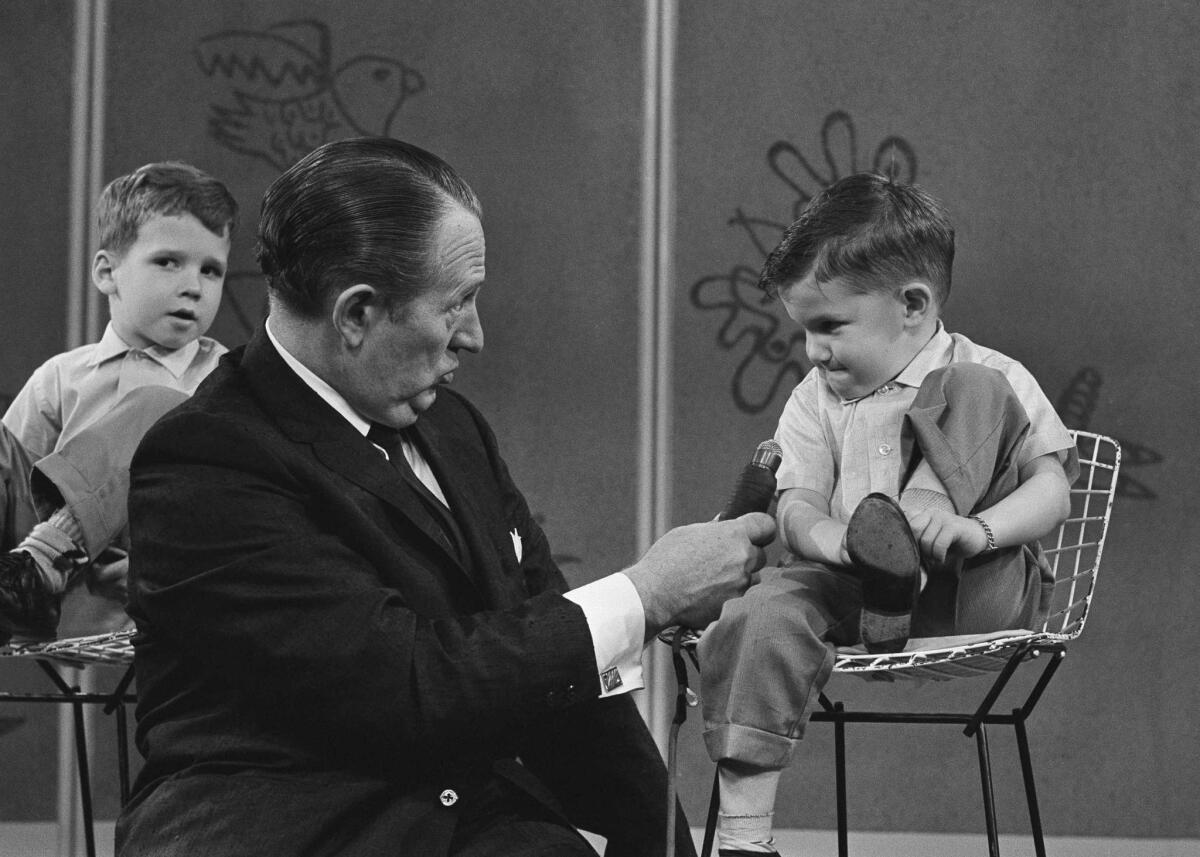Art Linkletter dies at 97; broadcasting pioneer created âKids Say the Darndest Thingsâ

Art Linkletter interviews 4-year-old Ronnie Glahn on his show in 1962.
Art Linkletter, the radio and television talk-show pioneer who was best known for eliciting hilarious remarks from the mouths of babes and who late in life was a popular motivational speaker and author, challenging seniors to live as zestfully as he did, has died. He was 97.
FOR THE RECORD: An earlier version of this article misspelled Art Linkletterâs birth name as Arthur Gordon Kelley. His last name was Kelly.
Linkletter died Wednesday at his home in Bel-Air, said his son-in-law, Art Hershey.
He was an accomplished businessman whose Linkletter Enterprises controlled more than 70 businesses. He became a well-known anti-drug crusader after a daughter committed suicide in 1969. He wrote three autobiographies, a 1988 best-seller called âOld Age Is Not for Sissiesâ and released the latest of more than 20 books â about making the most of lifeâs later years â on his 94th birthday.
To many baby boomers and their parents who watched his daytime television show âHouse Party,â Linkletter would always be the perfect straight man who could ask a grade-schooler a simple question like âWhat does your mommy do?â and elicit this response: âShe does a little housework, then sits around all day reading the Racing Form.â
That popular segment from the television show that aired from 1952 to 1970 led to his 1957 bestselling book âKids Say the Darndest Thingsâ and several sequels.
The idea to showcase childrenâs unrehearsed comments came to him during a conversation with his oldest child, Jack, after the boyâs first day in kindergarten.
Informed by Jack that he would never go back to school, his father asked why. Jack responded: âBecause I canât read, I canât write and they wonât let me talk.â
Linkletter captured the exchange on an early recording machine and played the interview on his âWhoâs Dancing Tonight?â Sunday program broadcast from the St. Francis Hotel in San Francisco. An avalanche of mail arrived saying âwhat a wonderful thing it is to hear a little boy talking to his daddy,â Linkletter told The Times in 2007. âAnd it struck me that there were no interviews with children as children; they were always professional children â trained, coached and written for.â
The segment debuted in 1945 on the CBS radio version of âHouse Party.â When the show segued to television in the early 1950s, he sought out spunky Los Angeles youngsters who wouldnât be intimidated by the trappings of an early TV studio. Linkletter asked local teachers to âPick the kids youâd like to have out of the classroom for a few precious hours.â
One boyâs answer, when asked what animal he wished to be, provided the funniest response, Linkletter once told an interviewer. An octopus, the boy said, so that he could grab the many bullies in his school and hit them with his âtesticles.â
Linkletter knew âwithout a doubtâ that heâd be remembered for his popular interactions with children.
âEverywhere I go I hear, âWhy donât you interview the kids again?â ââ Linkletter told the Washington Post in 1981.
The Canadian-born Linkletter hosted âPeople are Funnyâ and the Emmy-winning âHouse Partyâ on radio and television for more than 25 years. He last regularly appeared on TV as a contributor on âKids Say the Darndest Things,â a half-hour show Bill Cosby hosted on Friday nights from 1998 to 2000.
A prolific author, Linkletter wrote at least six books featuring cute quotes from kids, but he also tackled drug abuse, salesmanship and public speaking. His 1960 autobiography was called âConfessions of a Happy Man.â
With Mark Victor Hansen, co-creator of the âChicken Soupâ book series, Linkletter wrote the anti-aging book âHow to Make the Rest of Your Life the Best of Your Lifeâ (2006). During the tour for the book, Linkletter signed 400 copies in one sitting. As of 2008, he continued to lecture more than 60 times a year and run Linkletter Enterprises.
âIâve been around long enough to develop some insights,â Linkletter told the Orlando Sentinel in 2007, âDonât retire, become a âseniorpreneur,â keep a positive outlook, and maintain your sense of humor.â
âRetire?â he said in response to a Times reporterâs question in 1988, when he paused for an interview between skiing at Vail, Colo., and scuba diving off Brisbane, Australia. âIf you retire, you canât ever have a day off.â
Linkletter was born Gordon Arthur Kelly in the Canadian hamlet of Moose Jaw, Saskatchewan, on July 17, 1912, and was abandoned as an infant. Adopted by an elderly itinerant evangelist and cobbler, Fulton John Linkletter, and his wife, Mary, he moved to California with his family as a young child.
After graduating from high school at 16, Linkletter did odd jobs around the United States. He worked as a busboy in Chicago, a stevedore in New Orleans, a meatpacker in Minneapolis, a coupon clerk on Wall Street during the fateful crash of 1929 and a shipboard laborer between New York and Buenos Aires.
Eventually, he enrolled in what is now San Diego State University, intending to become an English professor. In his junior year, Linkletter was hired as an announcer at San Diego radio station KGB. After earning his bachelorâs degree in 1934, Linkletter turned down a teaching job to stick with announcing â it paid more.
Radio success came quickly. He was named program director of the California International Exposition in San Diego in 1935, radio director of the Texas Centennial Exposition in 1936 and took the same job a year later at the San Francisco Worldâs Fair.
In 1942, Linkletter moved to Hollywood, where he excelled in creating and starring in audience-participation shows. Working with partner John Guedel, who had created âPeople Are Funny,â Linkletter pioneered zany stunts and interviews that became the prototype for radio and televisionâs now-familiar game shows, childrenâs shows, talk shows and reality shows.
âI have to laugh at all of the stuff theyâre talking about as if realism was just invented, sending people out to do crazy real things with no script and no rehearsal,â Linkletter told CNNâs Larry King in 2003. âWeâd rig a fake contest, have the winner go up to San Francisco with her husband. And while they were gone, weâd steal their house. When they came back, we had them search for the house.â
He sent show participants out to give away money or invest in the stock market to prove that âPeople Are Funny.â The show aired on NBC radio beginning in 1942 and on TV from 1954 to 1961.
Shorter-running TV programs included the prime-time âLife with Linkletterâ on ABC (1950-52) and âHollywood Talent Scoutsâ on CBS (1965-66).
In 1955, Linkletter served as the primary host of Disneylandâs 1955 opening-day ceremonies. When his good friend Walt Disney said he could only pay him union scale, Linkletter asked for and received exclusive rights to the camera and film concession at Disneyland for a decade.
Although Linkletter appeared in two movies, âPeople Are Funnyâ (1946) with Jack Haley and Rudy Vallee and âChampagne for Caesarâ (1950) with Ronald Colmanand Vincent Price, Linkletter assessed his strength not as an actor but as a chatty, amiable conversationalist.
âI always wanted to be a star,â he once said. âI had no talent. But the most important talent you can have in television is to be liked. People liked me.
âSecondly, I sincerely and truly liked people, and I was curious about their answers. Even the jerks â I wanted to know what made them such jerks.â
Linkletter became a wealthy businessman, investing in hula hoops and delving into oil wells, lead mines, manufacturing plants, restaurants, television production, real estate, construction, mobile storage units and even a bowling alley, a skating rink and a charm school.
As Linkletter accumulated great wealth, the poor-boy-made-good became a generous philanthropist.
As he aged, Linkletter also worked to help other seniors, serving as president of the UCLA Center on Aging, national spokesman for the senior lobbying group now known as USA Next and board chairman of the John Douglas French Alzheimerâs Foundation.
In 2003, he was one of three grand marshals in the Rose Parade.
Linkletter weathered private tragedy with the early deaths of two of his five adult children.
He became a national spokesman on drug abuse after his youngest child, Diane, leaped to her death from her Hollywood apartment in 1969 at age 20, a suicide the family blamed on LSD use. He and his daughter won a Grammy for their spoken-word recording âWe Love You, Call Collect,â an emotional father-daughter conversation recorded not long before her death.
His second son, Robert, was killed at 35 in a 1980 car crash.
His eldest son, Jack, who followed his father into broadcasting and worked in the family business empire, died at 70 of lymphoma in 2007.
Linkletter served on the Presidentâs National Advisory Council for Drug Abuse Prevention and was president of the National Coordinating Council on Drug Abuse Education and Information.
The nonagenarian told anyone who asked that he watched his diet, swam or biked and lifted weights five times a week and slept eight hours a night. He skied until he was 92.
He also gave credit for his vigor and longevity to his wife, the former Lois Foerster, whom he married in 1935.
âI have a good marriage, which reduces a great deal of stress,â Linkletter told the Associated Press in 2006.
âBut a lot of itâs what happens between your ears,â he often said. âBy changing the attitude inside your mind, you can change the outside of your life. You got to be curious.â
He was so optimistic about his own future that he had signed a contract to lecture in Washington, D.C., on his 100th birthday on July 17, 2012.
In addition to his wife, Linkletter is survived by daughters Dawn Griffin and Sharon Linkletter; seven grandchildren; and 15 great-grandchildren.
Oliver is a former Times staff writer.
More to Read
Start your day right
Sign up for Essential California for the L.A. Times biggest news, features and recommendations in your inbox six days a week.
You may occasionally receive promotional content from the Los Angeles Times.







